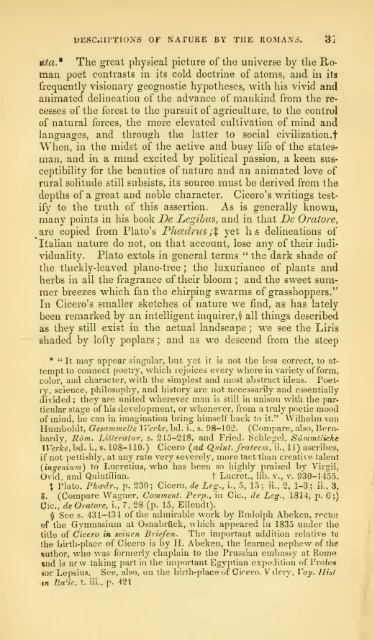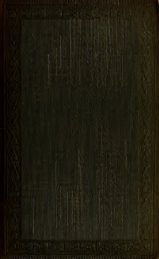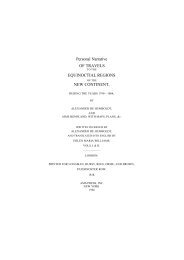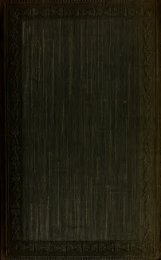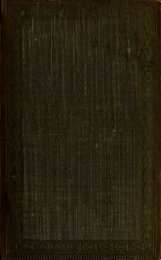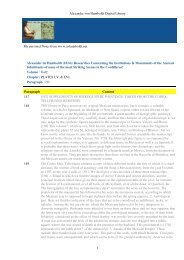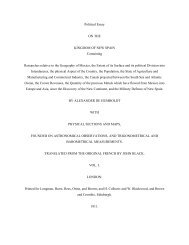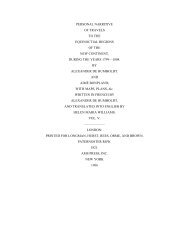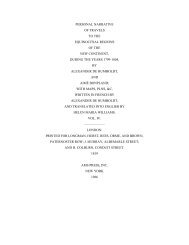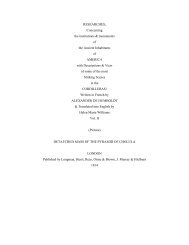See the complete document here
See the complete document here
See the complete document here
You also want an ePaper? Increase the reach of your titles
YUMPU automatically turns print PDFs into web optimized ePapers that Google loves.
ESC*lIPTIONS OF NATURE BY THE ROMANi. 3j<br />
iita* The great physical picture of tho universe by <strong>the</strong> Roman<br />
poet contrasts in its cold doctrine of atoms, and iii its<br />
frequently visionary geognostic hypo<strong>the</strong>ses, with his vivid and<br />
animated delineation of <strong>the</strong> advance of mankind from <strong>the</strong> re-<br />
cesses of <strong>the</strong> forest to <strong>the</strong> pursuit of agriculture, to <strong>the</strong> control<br />
of natural forces, <strong>the</strong> more elevated cultivation of mind and<br />
languages, and through <strong>the</strong> latter to social civilization.!<br />
When, in <strong>the</strong> midst of <strong>the</strong> active and busy life of <strong>the</strong> statesman,<br />
and in a mmd excited by political passion, a keen susceptibility<br />
for <strong>the</strong> beauties of nature and an animated love of<br />
rural solitude still subsists, its source must be derived from <strong>the</strong><br />
depths of a great and noble character. Cicero's writings test-<br />
ify to <strong>the</strong> truth of this assertion. As is generally known,<br />
many points in his book De Legibus, and in that De Oratore,<br />
are copied from Plato's PlicBclrus ;% yet lis delineations of<br />
Italian nature do not, on that account, lose any of <strong>the</strong>ir individuality.<br />
Plato extols in general terms " <strong>the</strong> dark shade of<br />
<strong>the</strong> thickly-leaved plane-tree ; <strong>the</strong> luxuriance of plants and<br />
herbs in all <strong>the</strong> fragrance of <strong>the</strong>ir bloom ;<br />
and <strong>the</strong> sweet sum-<br />
mer breezes which fan <strong>the</strong> chirping swarms of grasshoppers."<br />
In Cicero's smaller sketches of nature we find, as has lately<br />
been remarked by an intelligent inquirer, § all things described<br />
see <strong>the</strong> Liris<br />
as still <strong>the</strong>y exist in <strong>the</strong> actual landscape we ;<br />
shaded by lofty poplars and as we descend from <strong>the</strong> ; steep<br />
* ' It may appear singular, but yet it is not <strong>the</strong> less correct, to at-<br />
tempt to connect poetry, which rejoices every w<strong>here</strong> in variety of form,<br />
color, and character, with <strong>the</strong> simplest and most abstract ideas. Poet-<br />
ry, science, philosophy, and history are not necessarily and essentially<br />
divided ; <strong>the</strong>y are united w<strong>here</strong>ver man is still in unison with <strong>the</strong> particular<br />
stage of his development, or whenever, from a truly poetic mood<br />
of mind, he can iu imagination bring himself back to it." Wilhelm von<br />
Humboldt, Gesammelfe Werke, bd. i., s. 98-102. (Compare, also, Bernhardy,<br />
Rom. Litteratur, s. 215-218, and Fried. Schlegel, Sdmmtliche<br />
\Verke,hCi. i., s. 108-110.) Cicero (^ad Qumt. fratrcm, ii., 11) ascribes,<br />
if not pettishly, at any rate very severely, more tact than creative talent<br />
(ino'enium) to JiUcretius, who has been so highly praised by Virgil,<br />
Ovid, and Quintiliau. t Lucret., lib. v., v. 930-1455.<br />
t Plato, PhiBdr., p. 230; Cicero, de Le^., i., 5, 15; ii., 2, 1-3; ii., 3,<br />
0. (Compare Wagner, Comment. Perp., iu Cic, de Leg., 1814, p. 6;)<br />
Cic, de Oratore, i., 7, 28 (p. 15, EUeudt).<br />
$ <strong>See</strong> s. 431-434 of <strong>the</strong> admirable work by Rudolph Abeken, rectoi<br />
of <strong>the</strong> Gytnnasium at Osnabruck, which appeared iu 1835 under <strong>the</strong><br />
title of Cicero in seincn Briefen. The important addition relative to<br />
<strong>the</strong> birth-place of Cicero is by H. Abeken, <strong>the</strong> learned nephew of tha<br />
authoi', who was formerly chaplain to <strong>the</strong> Prussian embassy at Rome<br />
%nd is new taking part in <strong>the</strong> important Egyptian expedition of Frofes<br />
*or Lepsius. <strong>See</strong>, also, on <strong>the</strong> birth-place of Cirero. V dery, Voy. HisI<br />
tn ItaHe, t. iii., p. 421


